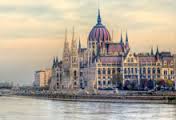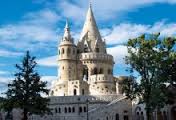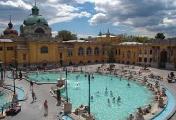| How to get to Budapest |
BY PLANE
It's very easy to get to Budapest by plane - several low-cost airlines and also the national airline have great offers and services.
Budapest International Airport is sixteen kilometres south-east of downtown Budapest. From the Ferihegy Terminal 2A is within the Schengen borders, Terminal B to countries outside the Schengen Convention depart airplanes.
Getting into town:
- All major car rental companies have offices in the arrivals hall of Budapest Ferihegy Airport.
- The Airport minibus is a popular and reasonably priced means of transport between the airport and the city.
- The public airport bus, BKV bus number 200E goes to M3 station Kőbánya-Kispest (blue line), about 20 minutes away. From here, the metro takes passangers straight into the city centre.
- A taxi to the centre of Budapest will cost anything between 3.500 Ft and 8.000 Ft
- The Budapest Airport (only Terminal 2 operates) is accessible by bus number 200E during the daytime and with night bus number 900 at night time. There is no train connection between the airport and the city centre.
Airport central number:
(+36-1)296-9696
Flight information:
+36-1)296-7000
Luggage search service:
Ferihegy 2A: (+36-1)296-8108, (+36-1)296-7217
Ferihegy 2B: (+36-1)296-7948, (+36-1)296-5965, (+36-1)296-5966
BY RAIL
There are 3 main international railway stations in Budapest: Eastern (Keleti), Western (Nyugati) and Southern (Déli). More than 50 trains a day provide direct links between Budapest and 25 other European capital cities. Trains to Vienna run every 3 hours, 7 times a day. There is also a popular network of Inter City trains linking Budapest with the main Hungarian towns. All three international railway stations are part of the Budapest Underground system, the Metró. The Déli and Keleti are stops on the Red (Number 2) line and the Nyugati is on the Blue (Number 3) line.
1. Keleti pályaudvar (Eastern)
VIII.,Budapest, Baross tér Tel: (+36-1) 413 - 4610
2. Nyugati pályaudvar (Western)
VI.,Budapest, Nyugati tér Tel: (+36-1) 349-8503
3. Déli pályaudvar (Southern)
I., Budapest, Krisztina krt. 35-37. Tel: (+36-1) 375-6593
The Hungarian Railways
Visit www.elvira.hu for information.
For international information call
(36 1) 461-5500
For domestic information call (36 1) 461-5400
Eurail
We provide travelers:
- ‘Eurail train Passes’ for non-European citizens to travel in Hungary and other countries in Europe www.eurail.com.
- ‘InterRail train Passes’ for European citizens to travel in Hungary and other countries in Europe www.interrail.eu.
For tourists who want to explore Budapest and other places in Hungary we offer the Eurail Hungary Pass and InterRail Hungary Pass, which are dedicated to visit all the highlights of Hungary by train.
| Budapest General Information |
Budapest is in every way the centrepiece of Hungary, serving not only as the political and transportation hub of the country, but also as its most important nexus of commerce, culture, music and industry. Cut cleanly in half by the Danube River, this city has a storied legacy that spans the rise and fall of many empires and political agendas.
Budapest was not always the conglomerate city it is today; rather it was once two cities on either side of the Danube: eastern Pest (pronounced: Pesht) and western Buda. They converged in the late 19th century though the lines of division can still be both in architecture and terrain. The hilly region of Buda is home to Castle Hill and numerous medieval structures that attract tourists. Meanwhile, Pest has embraced modernity and the age of industry and globalisation.
Quality of life has grown dramatically in Hungary over the past decade. Once considered a tourist destination for bargain hunters and backpackers, Budapest is now much more sophisticated. This is evident across the board, from the prices of everyday goods to the lifestyles of the locals, who are able to spend increasingly more of their income on entertainment and non-essentials.
Budapest's rich heritage has garnered a great deal of international attention, and the city's beauty is undeniable. The UNESCO World Heritage list includes Castle Hill and Andrassy Avenue in Buda, and across the city visitors have access to a wealth of museums that chronicle the region's history and diverse culture.
The dining scene in Budapest is gaining momentum as well. Restaurants are moving beyond mere Hungarian staples to cater for broader culinary interests. In recent years, restaurants have branched out across the city, and international fare is served alongside local favourites.
Entertainment here is a first-class affair. Prestigious operas are staged in the Opera House, with an impressive variety of classical music on the agenda throughout the year. Hungarians appreciate the formality of such affairs, and many of their festivals and public holidays draw locals and tourists alike to formal balls and lavish banquets.
Accommodation is widely available, with facilities that cater for every budget. Hotels are housed in five-star complexes, such as the Hilton, in simpler Soviet-era houses and in everything in between.
Locals claim that Budapest hasn't changed in centuries, a fact that, amazingly, rings true despite the wars and tumultuous history that this city has lived through. Whether seeking grand architecture or a simple escape into the backcountry of the Danube Delta, there's something here for every brand of traveller.









